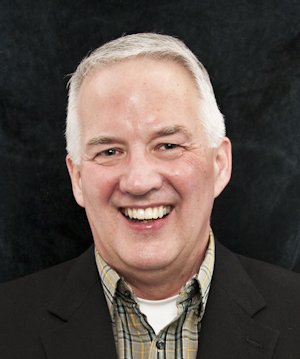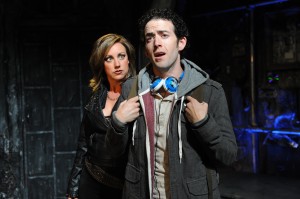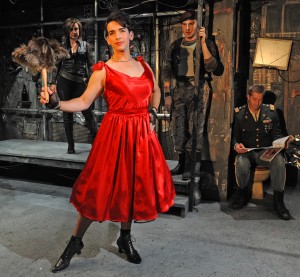Contemporary Pippin Performs Well But Casts No Spell
The opening number of Pippin, Stephen Schwartz and Roger O. Hinson’s 1970s-era musical, is titled “Magic To Do.” Invoking magic in the opening number sets a high bar to jump, and Diversionary Theatre’s production, while solid, doesn’t rise to the level of magic.
It has become fashionable to re-think Pippin, whose score by the composer of Godspell and Wicked includes hits such as “Corner of the Sky,” and “No Time at All.” The story is a relatively timeless one, as it takes off from the historical character of the eldest son of the great European emperor, Charlemagne. Pippin was sent to the University of Padua, where he was praised for his scholarly abilities. But, he left, at least so the musical’s story goes, because he dreamed of having a unique calling in life, one that he felt couldn’t be found through study.
A young man finding his way in life has been a pretty common theme for theatrical productions. Somehow, though, Pippin felt hopelessly stuck in the 70s, and directors have searched to find a way to make it feel contemporary.
Diversionary has partnered for this task with director James Vasquez for this project. Mr. Vasquez, whose last outing was Diversionary’s world premiere musical, Harmony, Kansas, is known in the San Diego theatre community for the reliable quality of his work. Sporting a drama degree from Julliard, his productions are thoughtfully considered and feature strong ability at storytelling. He’s also not afraid to take a risk or two in support of his vision.
With Pippin, Mr. Vasquez takes several risks, not all of which work. He brought in a design team (in particular, Sean Fanning for scenic design and Shirley Pierson for costume design) to create a junkyard dog look of found items and “deconstructed” costumes that collectively would make the feel of the show seem contemporary (there’s an essay about this vision in the program – click on the link to the program below to read it). He’s also been creative with casting: there is a woman (Courtney Corey) as the Leading Player (a role originated by Ben Vereen), a high school student (Hunter Schwarz) as Theo, a part typically played by a child, and some well-known local actors (Andy Collins and Tony Houck) are cast against type.
As Diversionary says that its mission is “Telling LGBT stories to a diverse community,” there is also a queer sensibility to the storytelling. Fastrada, a female role, is played by a man in drag (Luke Jacobs), and Pippin himself (Louis Pardo) is portrayed as sensitive, not terribly masculine, and to some degree bullied both by men and by domineering women, such as Fastrada, and Berthe (Wendy Maples). The queer sensibility goes only as far as the limits of the show’s book, though, as Pippin ends up in a relationship with a woman named Catherine (Megan Carmitchel, whose character appears out of nowhere late in the story but who gets to sing up a storm in the process).
Freed at least to some degree from casting according to expectations (except for Mr. Pardo, who looks a fair amount like John Rubenstein, the originator of the role on Broadway), Mr. Vasquez seems to have cast for vocal quality. Each cast member has a nice voice, and music director Charlie Reuter has coached them to sing with nuance, both individually and collectively. Some of the characters have moments to shine, such as Ms. Maples with “No Time At All” (where the audience gets to sing along with the familiar chorus – but only the chorus, mind you), Mr. Jacobs with “Spread a Little Sunshine,” and Ms. Carmitchel with “There He Was.” And, even though he doesn’t get a solo number, Mr. Hauck, who specialty has been playing nervous nellies with wrists aflutter, butches it up effectively as Lewis, the King’s second son.
Others don’t fare as well. Mr. Collins sings and moves well enough but it seems too much of a stretch to imagine him as the stern, warrior-like Charlemagne. But, Ms. Corey seems the most at sea. An appealing performer, Ms. Corey has a singing belt straight out of Wicked, while the Leading Player’s music is written in a more of a soulful than a Broadway style. The Leading Player also is the purveyor of magic, but Mr. Vasquez has taken much of the magic out of the show, effectively hanging the Leading Player out to dry and flattening the finale, where magic becomes a significant theme.
Mr. Pardo’s Pippin is designed to be the straight man in a company of zanies, and he holds down his responsibilities quite well. Ms. Pierson’s costumes suit his character best, and his youthful look, fine characterization, and way with a song are likely to win you over quickly.
Despite the flaws, Mr. Vasquez and company have pleaded a good case for Pippin as contemporary entertainment. Performances continue through October 14 in University Heights.
[box] Diversionary Theatre presents Pippin, music and lyrics by Stephen Schwartz, book by Roger O. Hirson, and directed by James Vasquez. Performances run Thursday through Sunday, and ticket prices range from $27 – $41 (subject to change). Tickets may be purchased at the box office, by calling (619) 220-0097, or by visiting the Diversionary website.
DOWNLOAD PROGRAM HERE [/box]

In addition to reviewing theatre for San Diego Story, Bill also reviews for TalkinBroadway.com. He is a member of the San Diego Theatre Critics Circle and the American Theatre Critics Association. Bill is an emeritus professor in the School of Journalism and Media Studies at San Diego State University.




